高考一般将来时详解+例句
一般将来时——高考英语重点时态语态满分攻略
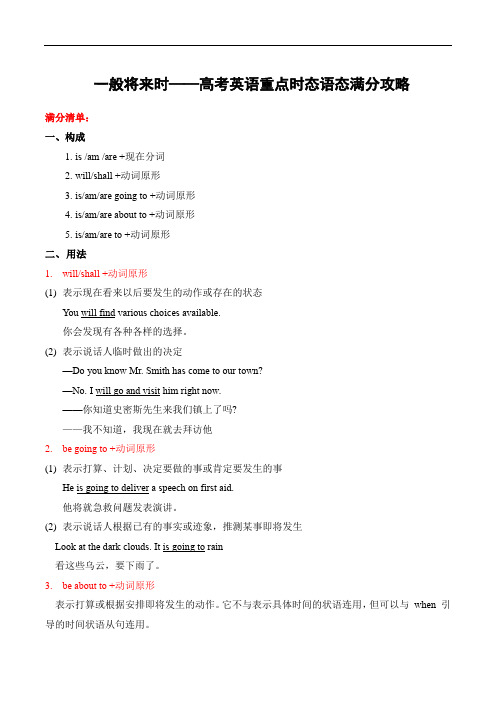
一般将来时——高考英语重点时态语态满分攻略满分清单:一、构成1.is /am /are +现在分词2.will/shall +动词原形3.is/am/are going to +动词原形4.is/am/are about to +动词原形5.is/am/are to +动词原形二、用法1.will/shall +动词原形(1)表示现在看来以后要发生的动作或存在的状态You will find various choices available.你会发现有各种各样的选择。
(2)表示说话人临时做出的决定—Do you know Mr. Smith has come to our town?—No. I will go and visit him right now.——你知道史密斯先生来我们镇上了吗?——我不知道,我现在就去拜访他2.be going to +动词原形(1)表示打算、计划、决定要做的事或肯定要发生的事He is going to deliver a speech on first aid.他将就急救问题发表演讲。
(2)表示说话人根据已有的事实或迹象,推测某事即将发生Look at the dark clouds. It is going to rain看这些乌云,要下雨了。
3.be about to +动词原形表示打算或根据安排即将发生的动作。
它不与表示具体时间的状语连用,但可以与when 引导的时间状语从句连用。
Ladies and gentlemen, you are about to hear a most incredible tale.女士们,先生们,你们马上就要听到一个令人非常难以置信的故事。
4.be to +动词原形(1)表示按计划或安排要做的事情The opening ceremony is to take place next Sunday.开幕式将于下周日举行。
(2)表示按职责、义务将要发生的动作You are to report it to the police.你应该报警。
一般将来时的12种表现形式(附词典例句)

一般将来时的12种表现形式(附词典例句)以下例句均出自词典(有标注)1.will /shall do 其中shall多用于第1人称;will可用于第2/3/1人称2.be going to do 表示决定、打算、计划做某事3.be doing4.be to do 表示计划、安排、约定、意图、将要,应该接近于should, ought to等5.be about to do6.be on the point of doing7.be due to do sth预定/预期/预计做某事8.祈使句9.倒装句——全倒装(只用一般过去时、一般现在时)10.情态动词 + do11.主将从现12.一般现在时的形式——表达将来的含义以下具体分述。
一般将来时的表现形式:以下例句均出自词典或高考真题(有标注)1.will /shall do 其中shall多用于第1人称;will可用于第2/3/1人称表示将要发生的动作或存在的状态表示倾向、习惯、必然发生的事shall用于第2/3人称,表示意志/决心/规定/必然性A meeting will be held next Tuesday at 3p.m.下星期二下午3点将召开一个会议(朗文5p2895)What time will she arrive? 她什么时候到达?(朗文5p2895)Trish will keep asking silly questions.特里斯老是不停地问一些愚蠢的问题。
(表示习惯,同上)Oil will float on water. 油总是浮于水面。
(表示总是、必然,朗文5p2895)Accidents will happen. 意外总是难免的。
(表示总是、惯于,朗文5p2895)We shall be away next week. 我们下周要出去。
(朗文5p2307)I’ve never liked her and I never shall. 我从来都不喜欢她,以后也不会。
(完整版)高中一般将来时讲解

(完整版)高中一般将来时讲解高中一般将来时讲解(完整版)一般将来时是英语语法中的一个重要时态,用来表示将来发生的动作或状态。
在高中阶段,学生需要掌握和运用一般将来时来描述将来的计划、意图、预测等。
下面我们将详细介绍高中一般将来时的使用和构成。
使用一般将来时可以用于以下几种情况:1. 表示将来的计划或安排。
例如:I will go to the beach this weekend.(我将在这个周末去海滩。
)2. 表示将来的意图。
例如:She will study medicine in college.(她打算在大学研究医学。
)3. 表示将来的预测或推测。
例如:It will rain tomorrow.(明天会下雨。
)构成一般将来时的构成非常简单,只需将"will"(shall)加在动词的原形前即可。
例如:I will study.(我将要研究。
)He will go.(他将要去。
)注意事项在使用一般将来时时,还需要注意以下几点:2. 疑问句的构成是将"will"(shall)置于句首。
例如:Will you attend the meeting?(你会参加会议吗?)3. 一般将来时通常不能用于表示固定的时间表或时间表安排,此时应使用其他时态。
例如:The train leaves at 9 a.m.(火车在上午9点离开。
)希望以上内容能够帮助你更好地理解和运用高中一般将来时。
如果还有任何问题,请随时向我提问。
【备战高考】英语一般将来时用法详解

【备战高考】英语一般未来时用法详解【备战高考】英语一般未来时用法详解一、单项选择一般未来时1.The purpose of education be to provide students with a value system–not to preparethem for a specific job.A. will B. should C. could D. may【答案】 A【分析】B观察神态动词。
句意:教育的目的是供应给学生一个有价值的系统,而不是为特定的工作进行准备。
Should 表示应当。
2.If my brother doesn’ t go to the evening party, .A. neither do I B. I will either C. either will I D. nor will I【答案】 D【分析】试题剖析:观察倒装句:句意:假如我弟弟不去晚会,我也不去。
Neither/Nor+ 倒装句,表示“ 也不是”,由于 if 条件句用一般此刻时,取代一般未来时,因此主句是一般未来时,选 D。
考点:观察倒装句3.— You’ ve left the light on.— Oh, so I have. _____ and turn it off.A. I go B. I ’ ve gone C. I ’ ll go D. I ’ m going【答案】 C【分析】试题剖析:观察时态:句意:--你向来把灯开着。
--哦,是的,我立刻去,把它关了。
这里用一般未来时, CD 都能够表示一般未来时,will do 能够表示暂时决定,be going to do 打算做,选 C。
考点:观察时态4. - Will you be available at three o'clock tomorrow afternoon?- No. I ______ a lecture then.A. are attending B. will have attended C. will attend D. will be attending【答案】 D【分析】试题剖析:观察动词时态。
【英语】一般将来时详解+例句

— I have rewritten it so many times that I wonder if I ________ it.
A.finishB.finishedC.have finishedD.will finish
【答案】D
【解析】
试题分析:考查时态。能不能写完应是将来发生的动作,因此应用将来时。句意:——Lucy,你的作文写得怎样了?——我重写了太多次了,我怀疑能不能写完。故D正确。
考点:考查时态
13.I’m sure your suggestion will ____the problem.
A.contribute to solvingB.be contributed to solving
A.will leaveB.is leaving
C.was leavingD.has left
【答案】C
【解析】
be doing可以用来表示将来,指按照时间安排表即将发生的事情,是有计划安排的;will do强调的是主观性,不表达按时间安排表即将发生的事情。句意:得知班里一个尖子生因为家庭原因要离开学校,班主任很焦虑。
A.are toB.willC.are going toD.are about to
【答案】A
【解析】
试题分析:考查将来时的表达法。Be to do sth表示计划的事情;表示注定要做某事;也可以表示命令做某事,相当于have to, must,should; will表示一般的将来,或者临时决定做某事;be going to do sth表示按照计划安排要做某事;或者根据某种迹象要做某事;be about to do sth即将做某事,不与表示将来时的时间状语连用。句意:好的电影出品人要确保他的电影应该满足不断变化的市场的需要。该句中的be to =should.故A正确。
【英语】一般将来时详解+例句

【答案】A
【解析】
试题分析:考查动词时态。句意:给他提姆买个手机怎么样?毕竟他不再是个孩子了。我认为是必要的,因为我们有时会想确认他是否会回来吃饭。根据句意这是一个宾语从句,确认他是否将回来吃饭,是一般将来时,A. will come一般将来时B. comes一般现在时C. has come现在完成时D. would come过去将来时,所以A正确。
A.has been declining; will be
B.has declined; would be
C.had been in decline; would take
D.was on the decline; will take
【答案】A
【解析】
试题分析:考查时态辨析。根据句意和时间指示词in the past twenty years和介词before可以判断前后应该分别采用现在完成进行时和一般将来时。句意:日本经济在过去20年里一直在下滑。谁也不知道在它恢复增长前还需要多长的时间。根据句意可以判断,故选A。
3.—Did you tell your parents about the result?
—Oh, no, I forgot. Ithem now.
A.will be callingB.will callC.am going to tellD.am to call
【答案】B
【解析】
句意:A选项是将来进行时,表示将来某个时间正在进行的动作;B、C、D均表示一般将来时。will+v原形表示临时决定的;而be going to do和be to do是表示按计划或安排要做的事。根据语境可知说话人是经别人提醒才临时想起要把结果告诉他父母,所以应该用will+v原形。句意:--你告诉你父母结果了吗?--没有,我忘了。我现在就去告诉他们。
一般将来时例句100句

一般将来时例句100句一般将来时例句(一):1、There will be a bad news for you。
将有一个坏消息给你。
2、There will be a delicious supper for us 。
我们将有一顿美味的晚餐。
3、There will be a new dress for her。
她将有一条新裙子。
4、There will be a good news for you。
将有一个好消息给你。
5、There will be a show on the playground the day after tomorrow。
后天操场上将有一场表演。
6、There will be a concert tomorrow。
明天将有一场演唱会。
7、There will be a gift for me。
我将有一份礼物。
8、There will be a English class this afternoon。
今日午时有一节英语课。
9、There is going to have a English test next Monday。
下周一将有一次英语测验。
10、There will be a mobile phone tomorrow for me。
明天我将有一部手机。
11、There will be a fortable room for you tomorrow。
明天你将有一个舒适的房间。
12、There will be rain this evening。
今晚要下雨。
13、There will be television in our classroom。
我们教室将有一台电视机。
14、There will be a happy journey for her。
她将有一个愉快的旅程。
15、There will be a romantic wedding for you tomorrow。
一般将来时例句30句
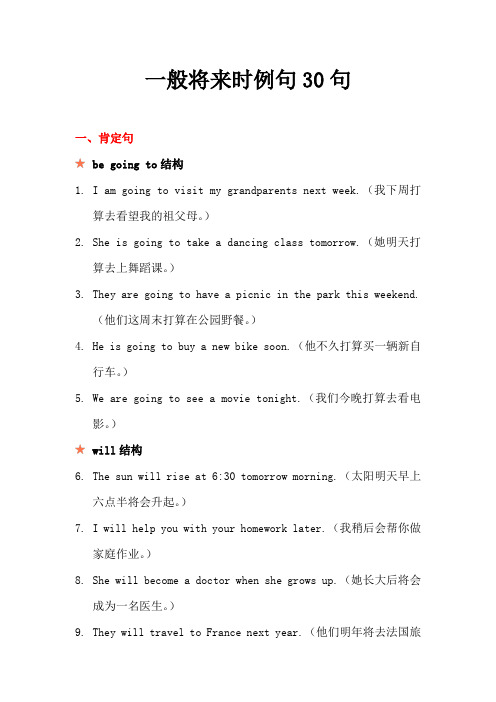
一般将来时例句30句一、肯定句be going to结构1.I am going to visit my grandparents next week.(我下周打算去看望我的祖父母。
)2.She is going to take a dancing class tomorrow.(她明天打算去上舞蹈课。
)3.They are going to have a picnic in the park this weekend.(他们这周末打算在公园野餐。
)4.He is going to buy a new bike soon.(他不久打算买一辆新自行车。
)5.We are going to see a movie tonight.(我们今晚打算去看电影。
)will结构6.The sun will rise at 6:30 tomorrow morning.(太阳明天早上六点半将会升起。
)7.I will help you with your homework later.(我稍后会帮你做家庭作业。
)8.She will become a doctor when she grows up.(她长大后将会成为一名医生。
)9.They will travel to France next year.(他们明年将去法国旅行。
)10.T he flowers will bloom in spring.(花在春天将会开放。
)二、否定句be going to结构11.I'm not going to play football because of the rain.(因为下雨我不打算去踢足球了。
)12.S he isn't going to go shopping this afternoon.(她今天下午不打算去购物。
)13.T hey aren't going to have a party tonight.(他们今晚不打算举办派对。
一般将来时详解+例句

6.Only by practising a few hours every day ________ be able to play the piano well.
A.you wouldB.would youC.you willD.will you
【答案】D
【解析】
试题分析:考查倒装句和时态:句意:只有你每天练习几个小时,你才能把钢琴弹好。Only+副词/介词短语/状语从句+主句(主句用部分倒装),而且这句话的时间是every day,所以用一般现在时will,选D。
A.am going to takeB.takeC.have takenD.would take
【答案】A
【解析】
试题分析:考查时态。根据句中的时间状语this weekend,可以判断用将来时。英语中经常用现在进行时代替将来时。句意:——这个周末你有什么特别的计划?——是的,我打算带我女儿去迪斯尼。故A正确。
考点:考查倒装句和时态
点评:固定句式:it be一段时间before从句;当Before引导的时间状语从句中使用一般现在时的时候,前面的主句使用将来时。May放在句首,运用倒装句表示对对方的祝愿。
3.A good film producer must make sure that his films ____ fit into the needs of the changing market.
考点:考查倒装句和时态
7.— Tom! I forgot to bring my notebook this morning.
— Don’t worry! Iit for you.
A.will getB.getsC.am gettingD.am going to get
10个一般将来时句子

10个一般将来时句子篇一:一般将来时的句子一般将来时的句子一、主语+ be going to + 动词原形肯定句:I amHe isThey are going to否定句:I am not going to get up. He is notThey are not going to一般疑问句:Are 肯定回答:Yes, I am. 否定回答:No, I’m not.一般疑问句:Is he going to get up?肯定回答:Yes, he is. 否定回答:No, he isn’t.一般疑问句:Are 肯定回答:Yes, they are. 否定回答:No, they aren’t.二、主语+ will + 动词原形肯定句:I willHe willThey 否定句:I will not get up.He will notThey 一般疑问句:Will 肯定回答:Yes, I will. 否定回答:No, I won’t.一般疑问句:肯定回答:否定回答:一般疑问句:肯定回答:否定回答:Will he get up. Yes, he will.No, he won’t. AreYes, they are.No, they aren’t.篇二:一般将来时的句子一般将来时的句子1、明天谁将要来这里? Who will come here tomorrow? 2、九月份我将会返校。
I will come back to school in September. 3、下周会发生什么? What will happen in the following week?4、今天下午我们打算开班会。
We are going to have a class meeting this afternoon.5、Look at the black clouds. Its going to rain.看那些乌云,快要下雨了。
一般将来时详解+例句
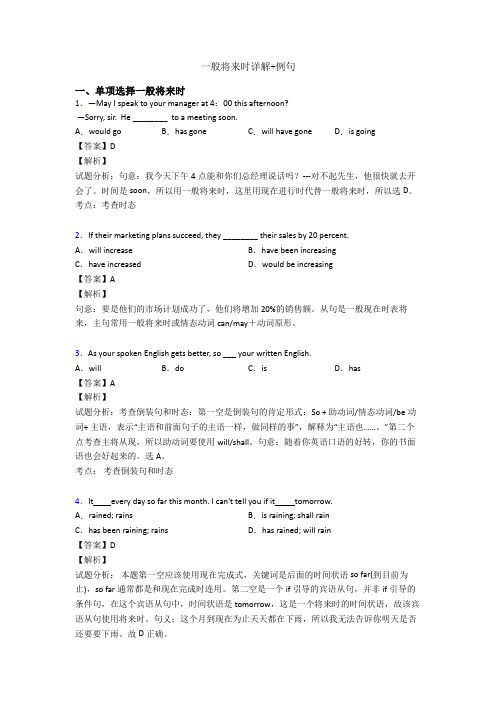
【解析】
B考察动词时态。句意:一种新款的鞋一旦投入市场,将会接到大量的订单,因为这种鞋的鞋跟高度可以在4到9厘米之间变化。If引导的状语从句,主句表示将来,从句用现在时代替将来时。光顾B正确。
14.If you _____ his wife’s income____ his own,the total of their income _____ 3000 yuan.
— Never mind. ________ it myself after school.
A.forget; I’d rather buyB.forgot; I’ll buy
C.forgot; I’m going to buyD.forget; I’d better buy
【答案】B
【解析】
【详解】
C.hadn’t showed upD.doesn’t show up
【答案】B
【解析】
试题分析:考查时态。根据语境及时间状语tomorrow afternoon可知用一般将来时。句意:——期望有多少人来参加你明天的宴会?——我送出了30份邀请,但三分之一将不会出现。故B正确。
考点:考查时态
19.— Sorry, I ________ to buy the book you need for you.
A.you wouldB.would youC.you willD.will you
【答案】D
【解析】
试题分析:考查倒装句和时态:句意:只有你每天练习几个小时,你才能把钢琴弹好。Only+副词/介词短语/状语从句+主句(主句用部分倒装),而且这句话的时间是every day,所以用一般现在时will,选D。
一般将来时例句100句
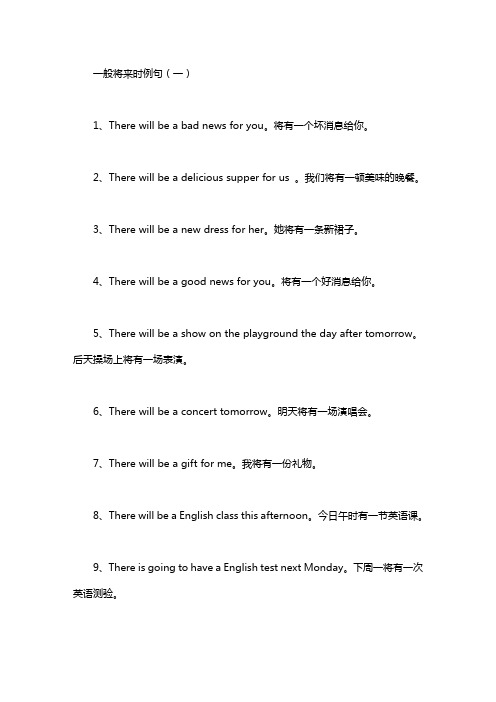
一般将来时例句(一)1、There will be a bad news for you。
将有一个坏消息给你。
2、There will be a delicious supper for us 。
我们将有一顿美味的晚餐。
3、There will be a new dress for her。
她将有一条新裙子。
4、There will be a good news for you。
将有一个好消息给你。
5、There will be a show on the playground the day after tomorrow。
后天操场上将有一场表演。
6、There will be a concert tomorrow。
明天将有一场演唱会。
7、There will be a gift for me。
我将有一份礼物。
8、There will be a English class this afternoon。
今日午时有一节英语课。
9、There is going to have a English test next Monday。
下周一将有一次英语测验。
10、There will be a mobile phone tomorrow for me。
明天我将有一部手机。
11、There will be a fortable room for you tomorrow。
明天你将有一个舒适的房间。
12、There will be rain this evening。
今晚要下雨。
13、There will be television in our classroom。
我们教室将有一台电视机。
14、There will be a happy journey for her。
她将有一个愉快的旅程。
15、There will be a romantic wedding for you tomorrow。
明天你将有一场浪漫的婚礼。
一般将来时详解+例句
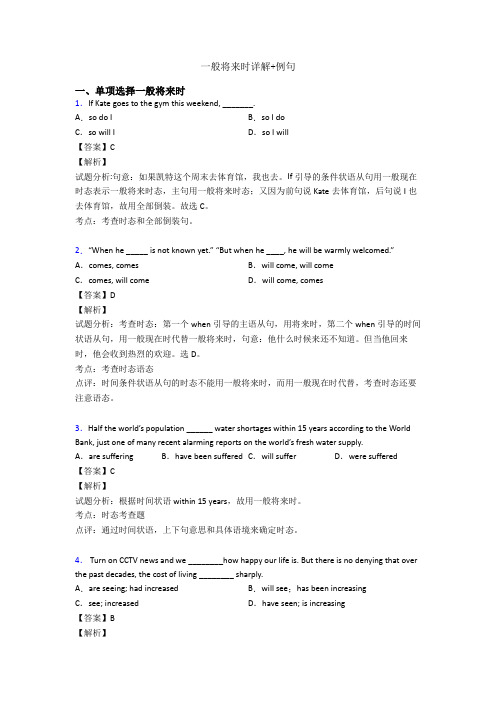
一般将来时详解+例句一、单项选择一般将来时1.If Kate goes to the gym this weekend, _______.A.so do I B.so I doC.so will I D.so I will【答案】C【解析】试题分析:句意:如果凯特这个周末去体育馆,我也去。
If引导的条件状语从句用一般现在时态表示一般将来时态,主句用一般将来时态;又因为前句说Kate去体育馆,后句说I也去体育馆,故用全部倒装。
故选C。
考点:考查时态和全部倒装句。
2.“When he _____ is not known yet.” “But when he ____, he will be warmly welcomed.”A.comes, comes B.will come, will comeC.comes, will come D.will come, comes【答案】D【解析】试题分析:考查时态:第一个when引导的主语从句,用将来时,第二个when引导的时间状语从句,用一般现在时代替一般将来时,句意:他什么时候来还不知道。
但当他回来时,他会收到热烈的欢迎。
选D。
考点:考查时态语态点评:时间条件状语从句的时态不能用一般将来时,而用一般现在时代替,考查时态还要注意语态。
3.Half the world’s population ______ water shortages within 15 years according to the World Bank, just one of many recent alarming reports on the world’s fresh water supply.A.are suffering B.have been suffered C.will suffer D.were suffered【答案】C【解析】试题分析:根据时间状语within 15 years,故用一般将来时。
一般将来时详解+例句

【答案】C
【解析】
C考查时态。答语意为“别担心,我帮你去取。等一下。”此处will用于一般将来时,表示“将要做临时决定的事情”。
11.It's really time I went home but I'm enjoying myself, so I ________ here a bit longer.
考点:时态。
9.—Help me out in the kitchen and I ________ you to a cup of coffee.
—Sounds good.
A.will treatB.treat
C.am treatingD.have treated
【答案】A
【解析】
考查时态。句意:——要是你在厨房里帮我忙的话,我将请你喝咖啡。——听起来不错。根据对话语境可知,应用一般将来时。
试题分析:考查动词时态。
考点:考查动词时态。
6.--Jack! I have left my key to the office at home.
-- Don’t worry. I _________ it for you. Wait a minute.
A.getB.am going to getC.will getD.am getting
考点:考查时态和全部倒装句。
19.Why don’t you put the meat in the fridge? It will_______fresh for several days.
一般将来时时态用法讲解
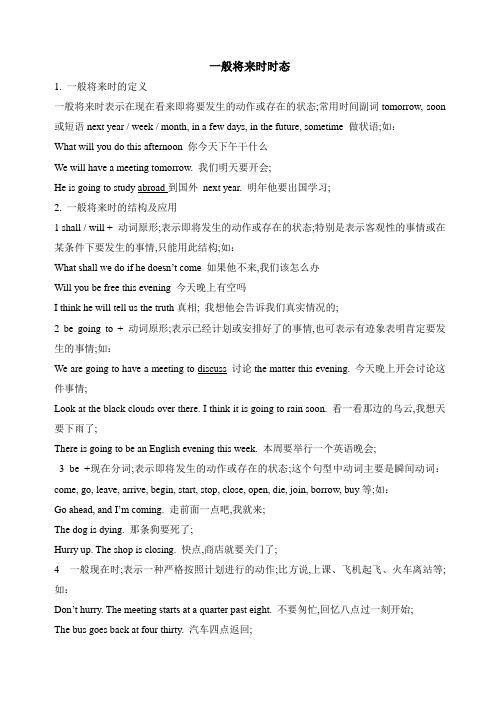
一般将来时时态1. 一般将来时的定义一般将来时表示在现在看来即将要发生的动作或存在的状态;常用时间副词tomorrow, soon 或短语next year / week / month, in a few days, in the future, sometime 做状语;如:What will you do this afternoon 你今天下午干什么We will have a meeting tomorrow. 我们明天要开会;He is going to study abroad到国外next year. 明年他要出国学习;2. 一般将来时的结构及应用1 shall / will + 动词原形;表示即将发生的动作或存在的状态;特别是表示客观性的事情或在某条件下要发生的事情,只能用此结构;如:What shall we do if he doesn’t come 如果他不来,我们该怎么办Will you be free this evening 今天晚上有空吗I think he will tell us the truth真相; 我想他会告诉我们真实情况的;2 be going to + 动词原形;表示已经计划或安排好了的事情,也可表示有迹象表明肯定要发生的事情;如:We are going to have a meeting to discuss 讨论the matter this evening. 今天晚上开会讨论这件事情;Look at the black clouds over there. I think it is going to rain soon. 看一看那边的乌云,我想天要下雨了;There is going to be an English evening this week. 本周要举行一个英语晚会;3 be +现在分词;表示即将发生的动作或存在的状态;这个句型中动词主要是瞬间动词:come, go, leave, arrive, begin, start, stop, close, open, die, join, borrow, buy等;如:Go ahead, and I’m coming. 走前面一点吧,我就来;The dog is dying. 那条狗要死了;Hurry up. The shop is closing. 快点,商店就要关门了;4 一般现在时;表示一种严格按照计划进行的动作;比方说,上课、飞机起飞、火车离站等;如:Don’t hurry. The meeting starts at a quarter past eight. 不要匆忙,回忆八点过一刻开始;The bus goes back at four thirty. 汽车四点返回;巩固练习:一、用所给动词的适当形式填空1.Li Lei tells me he _________________visitthe Great Wall长城this weekend.2.My mother _________________buyme a pair of new trousers tomorrow.3.She says she _________________leavesoon.4.We _________________go skating if it doesn’t rain next Sunday.5.There _________________bean English evening next week.6.Think over, and you _________________geta good idea.7.——___________Jim ___________havea picnic next Monday——-No, he __________.8.I _________________missyou after you leave here.9.Who _________________teachyou English next year10.He _________________ be back in three hours.11.Look at these clouds. It ___________________ rain.二、改错:每处划线中有错误,在题后改正1.He will sing anddancesfor us tomorrow.2.Are you going to swim ------Yes, Iwill.3.He will help Jim with his Englishevery day.4.Will her sistersingsa song for me tomorrow5.They willn’t plant trees next week.6.Are they going toplaysbasketball tomorrow7.Willwe go to visit the factory tomorrow8.Paulwill be going tomake dumplings for Emma.9.Are the boys going to the Great Wall next month ------Yes, theywill.三、句型转换:Jimis going to play footballtomorrow.Marywill clean the windowsnext week. 否定句:____________________________ ______________________________一般疑问句:_____________________________ ______________________________ 两回答:___________________________ _____________________________特殊疑问句:______________________ _____________________________四、选择题1. —Are you going to _______ our English team—Yes, I am.A. take part inB. joinC. took part inD. joined2. Xu Xia and her teammates are _______ the USA next week.A. leaving forB. leave forC. leaveD. left3. There _______ an English party in our class next week.A. is going to haveB. is going to beC. will haveD. Have4. If it _______ tomorrow, we will go to the park.A. isn’t rainB. don’t rainC. doesn’t rainD. won’t rain5. There ______ a football match next week. Shall we go and watch itA. will haveB. hasC. haveD. will be“Would you mind doing…”句型透视mind用作动词时,习惯后接动名词短语作宾语,而不接动词不定式,常用于Would you mind doing…句型中,具体用法是:1. “Would you mind doing…”句型常用于表示请求,意思是“请你做……你是否介意、请你做……好吗”,是一种比较客气的表达方式;如:Would you mind turning off the light in the room请你把房间里的灯关掉好吗如果要表示“请你不要做……你是否介意、请你不要做……好吗”,只需要在doing前面加上not.如:Would you mind not standing in front of me请你不要站在我的前面好吗2. 如果同意,表示不介意时,可用如下用语来表达:Certainly/Of course not./Not at all./No, not at all;如果不同意,表示介意时,常用“Sorry/I‘m sorry.”对不起及陈述某种理由来表示拒绝或反对;如:—Would you mind going to the movies this evening今晚去看电影好吗—I‘m sorry. But I haven’t finished my homework yet.对不起,我的作业还没有完成;学习时还要注意:1.“Would you mind doing…”句型中的would也可用do代替,但语气较生硬,不如用would客气;2.“Would you mind doing…”句型中的逻辑主语只能是谈话的对方you.如果想要对方允许自己做某事,可用“Would you mind my doing…”句型,如:Would you mind my smoking here你介意我在这里吸烟吗巩固练习:一、用下面提供的短语完成句子;1. help me wash my clothesWould you mind ______________________________2. give her a cup of teaWould you mind _______________________________3. help him mend his carDo you have _______________________________4. walk on the roadWould you mind _______________________________ on the road二、选择题1. —Would you mind _______ us in the game—Not at all.A. joiningB. joinC. join inD. joining in2. —Would you like to climb mountains with me this Sunday—I’d love to. But I _______ play table tennis against Class Three.A. am goingB. am going toC. amD. going to3. —Would you mind _______here—I’m sorry about that. I’ll go somewhere else.A. no smokingB. not smokingC. no smokeD. not smoke1. had better 的基本用法特点其意为“最好”、“应该”,后接动词原形,与情态动词should用法相似,其中的had通常缩略为’d:You’d better get some sleep.你最好去睡一会儿;Wego before it rains.我们最好在下雨前就去;2. had better如何构成否定式和疑问式构成否定式时,通常将not置于had better之后而不是had之后;而构成疑问式时,则通常将had而不是had better置于主语之前:I’d better not disturb him.我最好别去打扰他;What had we better do我们最好怎么办练习题1. —I’m afraid you have a cold. You’d better go to see a doctor.—_______A. No, I have no time.B. That’s a good idea.C. It’s very kind of you.D. I’m sorry to hear that.2. —I’m fat. What should I do—You’d better eat _______ meat and _______ fruits.A. less; moreB. less; lessC. more; lessD. more; more3. You had better ask your brother _______ playing computer games. It’s bad for him.A. to give upB. not to give upC. to give it upD. not give it up4. —I have a stomachache. What should I do—You _______ drink sweet water and _______ eat sweet food.A. had better not; shouldn’tB. should; had betterC. had better; had betterD. shouldn’t; should5. —I have a toothache.—You should _______.A. drink lots of waterB. take a restC. see a dentistD. have a good sleep情态动词的基本用法归纳情态动词有can could, may might, must, have to, shall should, will would, need needed, ought to等; 情态动词无人称和数的变化;不能单独使用,必须与其后的动词原形构成谓语;一、can, could1. 表示能力体力、知识、技能;Can you lift this heavy box体力Mary can speak three languages.知识Can you skate技能2.表示请求和允许;-----Can I go now----- Yes, you can. / No, you can’t.此时可与may互换;在疑问句中还可用could,might代替,不是过去式,只是语气更委婉,不能用于肯定句和答语中;---- Could I come to see you tomorrow---- Yes, you can. No, I’m afraid not.3.表示客观可能性客观原因形成的能力;They’ve changed the timetable, so we can go by bus instead.This hall can hold 500 people at least.4.表示推测惊讶、怀疑、不相信的态度,用于疑问句、否定句和感叹句中;Can this be trueThis can’t be done by him.How can this be true二、may, might1. 表示请求和允许;might比may语气更委婉,而不是过去式;否定回答时可用can’t或mustn’t,表示“不可以,禁止”;----Might/ May I smoke in this room---- No, you mustn’t.---- May/Might I take this book out of the room---- Yes, you can. No, you can’t / mustn’t.用May I...征徇对方许可时比较正式和客气,而用Can I...在口语中更常见;2.用于祈使句,表示祝愿;May you succeed3. 表示推测、可能性不用于疑问句;might不是过去式,它所表示的可能性比may小;1.He may /might be very busy now.2.Your mother may /might not know the truth.三、must, have to1. 表示必须、必要;You must come in time.在回答引出的问句时,如果是否定的,不能用mustn’t禁止,不准,而用needn’t, don’t have to不必.---- Must we hand in our exercise books today---- Yes, you must.---- No, you don’t have to / you needn’t.2. must是说话人的主观看法, 而have to则强调客观需要;must只有一般现在时, have to 有更多的时态形式;1 he play isn’t interesting, I really must go now.2 I had to work when I was your age.3.表示推测、可能性只用于肯定的陈述句1 You’re Tom’s good friend, so you must know what he likes best.2 Your mother must be waiting for you now.四、need作情态动词用时, 常用于疑问句、否定句;在肯定句中一般用must, have to, ought to, should代替;1You needn’t come so early.2 ---- Need I finish the work today---- Yes, you must. / No, you needn’t.2. need作实义动词用时, 有人称、时态和数的变化;而need后面只能接带to的不定式;He needs to finish his homework today.五、shall, should用于第一人称,征求对方的意见;What shall we do this evening用于第二、三人称,表示说话人给对方的命令、警告、允诺或威胁;1.You shall fail if you don’t work hard.警告2He shall have the book when I finish it.允诺3He shall be punished.威胁六、will, would1.表示请求、建议等,would更委婉;Will / Would you pass me the ball, please2..表示意志、愿望和决心;1. I will never do that again.2. They asked him if he would go abroad.3. would表示过去反复发生的动作或某种倾向;would表示过去习惯时比used to正式,且没有“现已无此习惯”的含义;1. During the vacation, he would visit me every other day.2. The wound would not heal.七、should表示“应该”1. I should help her because she is in trouble.2.表示推测should , 客观推测, must主观推测;1.He must be home by now. 断定他已到家2He ought to/should be home by now.不太肯定3 This is where the oil must be.直爽4This is where the oil ought to/should be.含蓄练习题1. —May I ask you some questions, Dr. Wang—_______A. You’re welcome.B. Sure, go ahead.C. No, I’m busy.D. Yes, you must.2. —Must I take part in the activity—No, you _______. You’re too young. You should look after yourself.A. mustn’tB. don’tC. can’tD. don’t have to3. —May I watch TV, Mom—I’m afrai d you _______.A. should notB. can’tC. must notD. may not4. —Must we keep the window _______ all the time—No, you don’t have to.A. openingB. openedC. to openD. open5. —Must I take the medicine every day—No, you _______.A. mustB. mustn’tC. needn’tD. can’t6. My mother is ill. I _______ stay at home to take care of her.A. canB. mayC. have toD. maybe7. —May I use your dictionary, Lily—Sure, _______.A. go aheadB. you can ask BillC. you can’tD. that’s all righ t反身代词用法归纳一、反身代词的基本形式反身代词是oneself根据所指词的人称、性别、单复数等的变化可以有myself, himself, herself, yourself, itself, ourselves, yourselves, themselves 等形式;二、oneself与himself当one指人时,其相应的反身代词通常用oneself, 在美国英语中也可用himself:One should not praise oneself himself. 一个人不应该自吹自擂;三、反身代词的句法功能:1. 用作同位语加强被修饰词的语气,紧放在被修饰名词后, 或句末:The box itself is not so heavy. 箱子本身并不重;Martin himself attended the sick man. 马丁亲自照顾病人;2. 用作宾语动词或介词的宾语:Take good care of yourself. 照顾好自己;She could not make herself understood. 她不能使别人听懂她的话;The child cried himself to sleep. 孩子哭着哭着睡着了;3. 用作表语The poor boy was myself. 那个可怜的孩子就是我自己;1. —He plays basketball so well Who taught _______—He learnt it by _______.A. him; himB. himself; himselfC. him; himselfD. himself; him要求四会的单词名词体育运动team match football tennis baseballskating rowing cycling basketball soccer人物或称谓类person player musician scientist pilotpoliceman policewoman postman fishermanhero grandfather grandmother grandparents物品类basket cup paper gold record brush ring处所类grass theatre/theater museum factory身体健康类body health toothache headache fevercough stomachache illness medicine heart食品饮料类coffee tea candy fruit sugartomato+es potato+es salt watermelon sandwichstrawberry beef biscuit meal时间类age century weekend文化信息类information website Internet dictionaryknowledge message passage culture其他shower fact care advicea piece of advice news pity article smoke risk question habit world war introduction note smile peacesouth middle taxi answer litter voice score line phone example skillpoint chance suggestion mind sidedream future friendship jump part形容词或副词weak←→strong least ←→most popular←→unpopularhealthy =fit←→ill fat ←→thin dirty←→cleanuseful←→ useless dark←→bright hungry←→ fulldead←→alive cheap ←→expensive=dear true←→ falsecorrect←→ wrong possible ←→impossible quite excited /exciting tired/tiringcertainly badly really finally even famous mad angry main successful enough terrible serious still funny active modern necessary动词:win cheer row join skate cycledream grow spend jump relaxleave kick pass throw fightenjoy/practice/ finish/ mind +doing sth. advise killinvent become follow hold scorepoint hit hear ring stand feel break record suggest lift boil brushlie cry care check worry causesmoke taste force risk build happen介词against through without off except词组荟萃名词词组table tennis the day after tomorrow day and nightice cream potato chips first aid relay race动词词组cheer...on grow up be good forbe good at=do well in←→do badly in take part in keep fit leave for fall ill give sb. a hand shout at sb.do one’s best=try one’s best be angry with talk about come into being stand for have a cold lie down worry about go ahead build sb. up take care of介词词组及其他for example at least in fact as...as possible in the futureon the other hand instead of all over at first课本中出现的词组或搭配归纳be able to be sure be interested in see sb. do/doing sth join the school rowing team join sb spend ... doing sth the high jump the long jump turn ... into... make sb./sth. +adj. all over the world help sb. do sth play against have funthe most popular sports stop sb from doing sth. such as/for example hundreds of years the boys’ 800-meter race lots of = a lot of make friends with sb. win the first place next timelook/ get well/better take one’s advicetake medicine take/have a bath have/take a restfeel like doing sth. go up go outfall down nothing serious stay uphave a good rest do morning/eye exercises tell/ask sb to do sth. give up show sb. sth.= show sth. to sb. too much重句大本营1.—What are you going to do—I’m going to play basketball.2.—Would you like to come and cheer us on—Sure,I’d love to.3.—Which sport do you prefer, swimming or rowing—I prefer rowing.4.—Are you going to join the school rowing team—Yes, I am./ No, I’m not.5.—What’s your favorite sport, ________—Basketball, of course.6.—Who’s your favorite pl ayer—LeBron James.7.—What are you going to be when you grow up—I’m going to be a scientist.8.—Why do you like playing soccer—Because it makes him strong and it’s popular all over the world.9.—_______, could you help me=give me a hand, please —Sure.10.—Will you join us—I’d be glad to.11.—Would you mind teaching me—Not at all. You can do it12.—Would you mind not putting your bike here—Sorry. I’ll put it somewhere else.13.—_______, I am sorry for what I said.宾语从句—It’s nothing.14.—Will you take part in the school sports meet—Of course I will.15.—Which sport will you take part in—The boys’ 800-meter race.16.—Hello, is _______ in—Speaking.17.—What shall we take—We’ll take our sports clothes and sports shoes.18.—Shall I take my camera—Good idea It’ll be fun19.—When shall we meet—Let’s make it half past six.20.—Where shall we meet—At my house.21.—Hello, _________ You don’t look well. What’s wrong with you=What’s thematter with you=What is the matter with you—I have a toothache/backache/stomachache/headache/fever.I have the flu. 22.—I hope you’ll get well soon.—Thank you.23.—How long have you been like this—Two days./For two days.24.—You’d better take some medicine.—I think I will.25.—How are you feeling today—Not too bad.26.—Staying up late is bad for your health.—Right I must have a good rest.27.—May I ask you some questions, Dr. Li—Sure, go ahead.28.—Must we go to see a doctor at once when we have the flu—Yes, we must./No, we needn’t.we don’t have to.29.—Could I speak to Dr. Li Yuping30.—I’m afraid he is busy right now.—Can I leave a message—Sure, go ahead.其他重要句型1.She spends half an hour exercising in the gym every day.2.There is going to be a school sports meet next weekend.3.They are leaving for Japan the day after tomorrow.4.Basketball is one of the most popular sports in the United States and other partsof the world.5.It’s important for you and the other players to play as a team.6.With hundreds of years’ history, it is one of the most popular sports in England.7.The Summer Olympics and Winter Olympics are both held every four years.8.You’d better stay in bed and not move your left leg too much.9.Follow the doctor’s advice, and you’ll get well soon.=If you follow the doctor’sadvice, you’ll get well soon.10.Be careful not to eat too much salt or sugar.11.But his mother made him taste it.12.They must give up smoking as soon as possible.13.Playing sports can also help you keep fit.。
一般将来时主谓宾和主系表例句
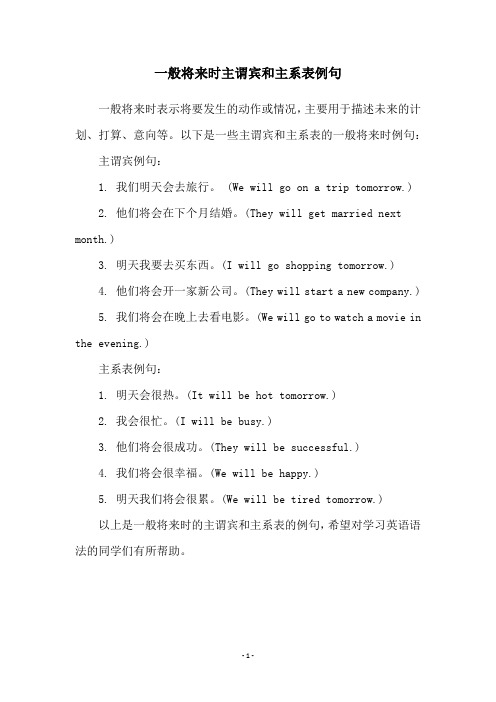
一般将来时主谓宾和主系表例句
一般将来时表示将要发生的动作或情况,主要用于描述未来的计划、打算、意向等。
以下是一些主谓宾和主系表的一般将来时例句:主谓宾例句:
1. 我们明天会去旅行。
(We will go on a trip tomorrow.)
2. 他们将会在下个月结婚。
(They will get married next month.)
3. 明天我要去买东西。
(I will go shopping tomorrow.)
4. 他们将会开一家新公司。
(They will start a new company.)
5. 我们将会在晚上去看电影。
(We will go to watch a movie in the evening.)
主系表例句:
1. 明天会很热。
(It will be hot tomorrow.)
2. 我会很忙。
(I will be busy.)
3. 他们将会很成功。
(They will be successful.)
4. 我们将会很幸福。
(We will be happy.)
5. 明天我们将会很累。
(We will be tired tomorrow.)
以上是一般将来时的主谓宾和主系表的例句,希望对学习英语语法的同学们有所帮助。
- 1 -。
一般将来时造句10句

一般将来时造句10句一般将来时表示将来某一时刻的动作或状态,或将来某一段时间内经常的动作或状态,常常和表示将来的时间状语连用。
那么你知道一般将来时要怎么造句子吗?下面店铺为大家整理了10句一般将来时的英语句子,欢迎大家参考学习!一、常见结构1、will / shall + 动词原形(否定句在will/shall后加not)这种方法一般单纯地表示将来某个时间将要发生的动作或存在的状态。
will用于各种人称;shall只用于第一人称。
例如 :I will / shall go to visit him next week. 下周我将去拜访他。
What time shall we go there tomorrow? 明天我们几点去那儿?2、be going to+动词原形be going to 相当于一个助动词(其中be有人称和数的变化),与它后面的动词原形一起构成谓语。
用来表示将要发生的动作以及计划、安排和打算要做的事。
例如:There is going to be a football match this afternoon.今天下午将有一场足球赛。
I‘m going to go to the park. 我将要去公园。
二、常用结构1、用于"I expect, I'm sure, I think, I wonder等的宾语从句"中。
Don't worry about the exam. I'm sure you'll pass.不要担心这次考试,我确信你会通过的。
2、用于祈使句和陈述句中。
Work hard and you will succeed.如果你努力,就会成功的。
3、与表示时间或条件的状语从句连用。
I'll let you know as soon as he arrives.他一到我就通知你。
1 Professor Wang will give us a presentation later.2 Who will come here tomorrow?3 I will visit you next month.4 What will happen in the following week?5 I will go to BeiJing tomorrow.6 What will you do tomorrow?7 Tom will come to my home at 3PM.8 England will play against France tomorrow.9 I will come back to school in September.10 Where will you play basketball next time?。
一般将来时的句子带翻译(最新)
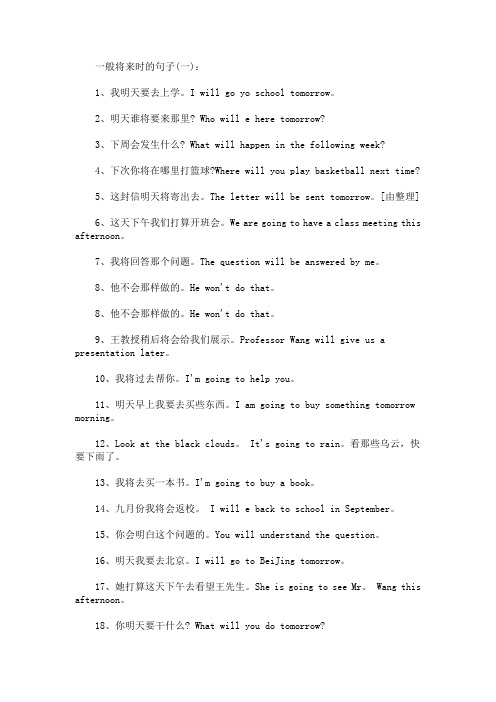
一般将来时的句子(一):1、我明天要去上学。
I will go yo school tomorrow。
2、明天谁将要来那里? Who will e here tomorrow?3、下周会发生什么? What will happen in the following week?4、下次你将在哪里打篮球?Where will you play basketball next time?5、这封信明天将寄出去。
The letter will be sent tomorrow。
[由整理]6、这天下午我们打算开班会。
We are going to have a class meeting this afternoon。
7、我将回答那个问题。
The question will be answered by me。
8、他不会那样做的。
He won't do that。
8、他不会那样做的。
He won't do that。
9、王教授稍后将会给我们展示。
Professor Wang will give us a presentation later。
10、我将过去帮你。
I'm going to help you。
11、明天早上我要去买些东西。
I am going to buy something tomorrow morning。
12、Look at the black clouds。
It's going to rain。
看那些乌云,快要下雨了。
13、我将去买一本书。
I'm going to buy a book。
14、九月份我将会返校。
I will e back to school in September。
15、你会明白这个问题的。
You will understand the question。
16、明天我要去北京。
I will go to BeiJing tomorrow。
一般将来时的解析
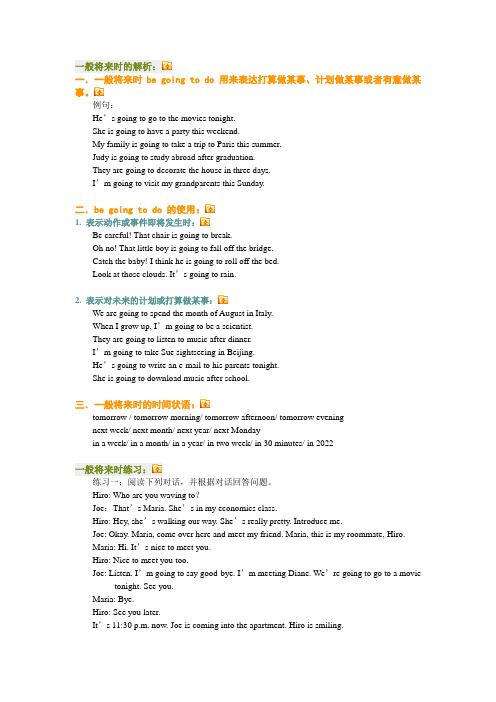
一般将来时的解析:一.一般将来时be going to do 用来表达打算做某事、计划做某事或者有意做某事。
例句:He’s going to go to the movies tonight.She is going to have a party this weekend.My family is going to take a trip to Paris this summer.Judy is going to study abroad after graduation.They are going to decorate the house in three days.I’m going to visit my grandparents this Sunday.二.be going to do 的使用:1. 表示动作或事件即将发生时:Be careful! That chair is going to break.Oh no! That little boy is going to fall off the bridge.Catch the baby! I think he is going to roll off the bed.Look at those clouds. It’s going to rain.2. 表示对未来的计划或打算做某事:We are going to spend the month of August in Italy.When I grow up, I’m going to be a scientist.They are going to listen to music after dinner.I’m going to take Sue sightseeing in Beijing.He’s going to write an e-mail to his parents tonight.She is going to download music after school.三.一般将来时的时间状语:tomorrow / tomorrow morning/ tomorrow afternoon/ tomorrow eveningnext week/ next month/ next year/ next Mondayin a week/ in a month/ in a year/ in two week/ in 30 minutes/ in 2022一般将来时练习:练习一:阅读下列对话,并根据对话回答问题。
- 1、下载文档前请自行甄别文档内容的完整性,平台不提供额外的编辑、内容补充、找答案等附加服务。
- 2、"仅部分预览"的文档,不可在线预览部分如存在完整性等问题,可反馈申请退款(可完整预览的文档不适用该条件!)。
- 3、如文档侵犯您的权益,请联系客服反馈,我们会尽快为您处理(人工客服工作时间:9:00-18:30)。
A.rained; rainsB.is raining; shall rain
C.has been raining; rainsD.has rained; will rain
考点:考查时态辨析
2.---It ______ be only two days before I have the job interview.
---______ you succeed.
A.must; MayB.must; ShouldC.will; MayD.will; Should
【答案】C
A.getsB.has been got
C.will getD.is getting
【答案】C
【解析】
试题分析:句意为“截止到医生检查完你的肺部,你才将会得到检查结果。By the time引导的是时间状语从句,从句中用现在完成时代替将来完成式,故主句用一般将来时。所以选C。
考点:考查时态
14.If their marketing plans succeed, they ________ their sales by 20 percent.
A.will haveB.am going to haveC.hadD.am having
【答案】A
【解析】
试题分析:句意:--早饭你准备吃什么?--我想我想吃些面包和牛奶。因为是将要吃..用一般将来时,排除C,ABD都可以表示一般将来时,will是临时决定,be going to do是计划,打算,be doing是即将,马上做…,所以选A。
11.If our marketing plan succeeds, we _______ the sales by thirty percent next year.
A.would increaseB.will increase
C.would have increasedD.will be increasing
考点:考查时态
6.- Will you be available at three o'clock tomorrow afternoon?
- No. I ______ a lecture then.
A.are attendingB.will have attendedC.will attendD.will be attending
A.doesB.wasC.hasD.will
【答案】D
【解析】
试题分析:句意:这是你自己的事情,如果你不重视,其他谁会重视呢?因为这句话的条件状语从句用一般现在时代替一般将来时,所以主句用一般将来时。所以选D。
考点:考查时态
13.By the time the doctor has made your lung checked, you_________ the result.
【答案】D
【解析】
本题考查时态。根据句意“我们将邀请她的一些朋友”可知用一般将来时。句意:——让我们在妈妈50岁给她一个惊喜。——好想法,我们将邀请她的一些朋友。
16.Mrs. Morris has left for London. She ________ a speech there next week.
B.has declined; would be
C.had been in decline; would take
D.was on the decline; will take
【答案】A
【解析】
试题分析:考查时态辨析。根据句意和时间指示词in the past twenty years和介词before可以判断前后应该分别采用现在完成进行时和一般将来时。句意:日本经济在过去20年里一直在下滑。谁也不知道在它恢复增长前还需要多长的时间。根据句意可以判断,故选A。
【解析】
试题分析:考查倒装句和时态。第一空考查了固定句式中的时态。固定句式:it be一段时间before从句;当Before引导的时间状语从句中使用一般现在时的时候,前面的主句使用将来时。第二空使用倒装句的形式may you succeed祝你成功。
考点:考查倒装句和时态
点评:固定句式:it be一段时间before从句;当Before引导的时间状语从句中使用一般现在时的时候,前面的主句使用将来时。May放在句首,运用倒装句表示对对方的祝愿。
A.are benefitedB.will benefit
C.will be benefitedD.had benefited
【答案】B
【解析】
试题分析:根据语境“美国和中国将受益于一个和平稳定的亚太地区”可知该句要用一般将来时,故选B。
考点:考查时态
18.— Mr.Gordon asked me to remind you of the meeting this afternoon.Don't you forget it!
考点:考查时态
8.The projectto developing the economy and reducing poverty when it is completed.
A.has contributedB.had been contributed
C.will contributeD.is contribute
考点:考察时态
5.— You’ve left the light on.
— Oh, so I have. _____ and turn it off.
A.I goB.I’ve goneC.I’ll goD.I’m going
【答案】C
【解析】
试题分析:考查时态:句意:--你一直把灯开着。--哦,是的,我马上去,把它关了。这里用一般将来时,CD都可以表示一般将来时,will do可以表示临时决定,be going to do打算做,选C。
A.has givenB.will giveC.givesD.gave
【答案】B
【解析】
【详解】
考查时态。句意:Morris女士已经去伦敦了。她下周将在那儿做一次演讲。由next week判断为一般将来时,故选B项。
17.Peace is necessary to all. After all, it is the United States and China, as the two largest economies in the world, that ________ most from a peaceful and stable Asia-Pacific.
【答案】B
【解析】
试题分析:考查时态。If条件句使用的是一般现在时代替一般将来时,所以主句也是一般将来时,和next year搭配使用。句意:如果我们的营销计划成功,我们明年销售将增加百分之三十。故B正确。
考点:考查时态
12.It’s your own business. If you don’t attach importance to it, who else?
—Really? But don’t worry!I________to the hospital and see him this afternoon.
A.will goB.am going
C.have goneD.went
【答案】A
【解析】
从第二人回答的“Really?”可以看出他在此之前并不知道Mike的计划,所以排除B项。
3.A good film producer must make sure that his films ____ fit into the needs of the changing market.
A.are toB.willC.are going toD.are about to
【答案】A
【解析】
【答案】C
【解析】
试题分析:考查动词的时态。句意:这项工程在竣工后,将会继续发展经济,减少贫穷。根据句意可知表示将要发生的事情,用一般将来时,选C
考点:考查动词的时
9.The sky is clouding over;we can see there ________ a rainstorm.
A.is going to beB.is going to have
15.---Let’s throw a surprise party for mom’s 50th birthday.
---That’s a good idea.We______several of her friends.
A.inviteB.have invitedC.are invitingD.will invite
考点:考查将来时的表达法
点评:Be to do sth表示计划的事情;表示注定要做某事;也可以表示命令做某事,相当于have to, must,should; will表示一般的将来,或者临时决定做某事;be going to do sth表示按照计划安排要做某事;或者根据某种迹象要做某事;be about to do sth即将做某事,不与表示将来时的时间状语连用。
试题分析:考查将来时的表达法。Be to do sth表示计划的事情;表示注定要做某事;也可以表示命令做某事,相当于have to, must,should; will表示一般的将来,或者临时决定做某事;be going to do sth表示按照计划安排要做某事;或者根据某种迹象要做某事;be about to do sth即将做某事,不与表示将来时的时间状语连用。句意:好的电影出品人要确保他的电影应该满足不断变化的市场的需要。该句中的be to =should.故A正确。
【答案】D
